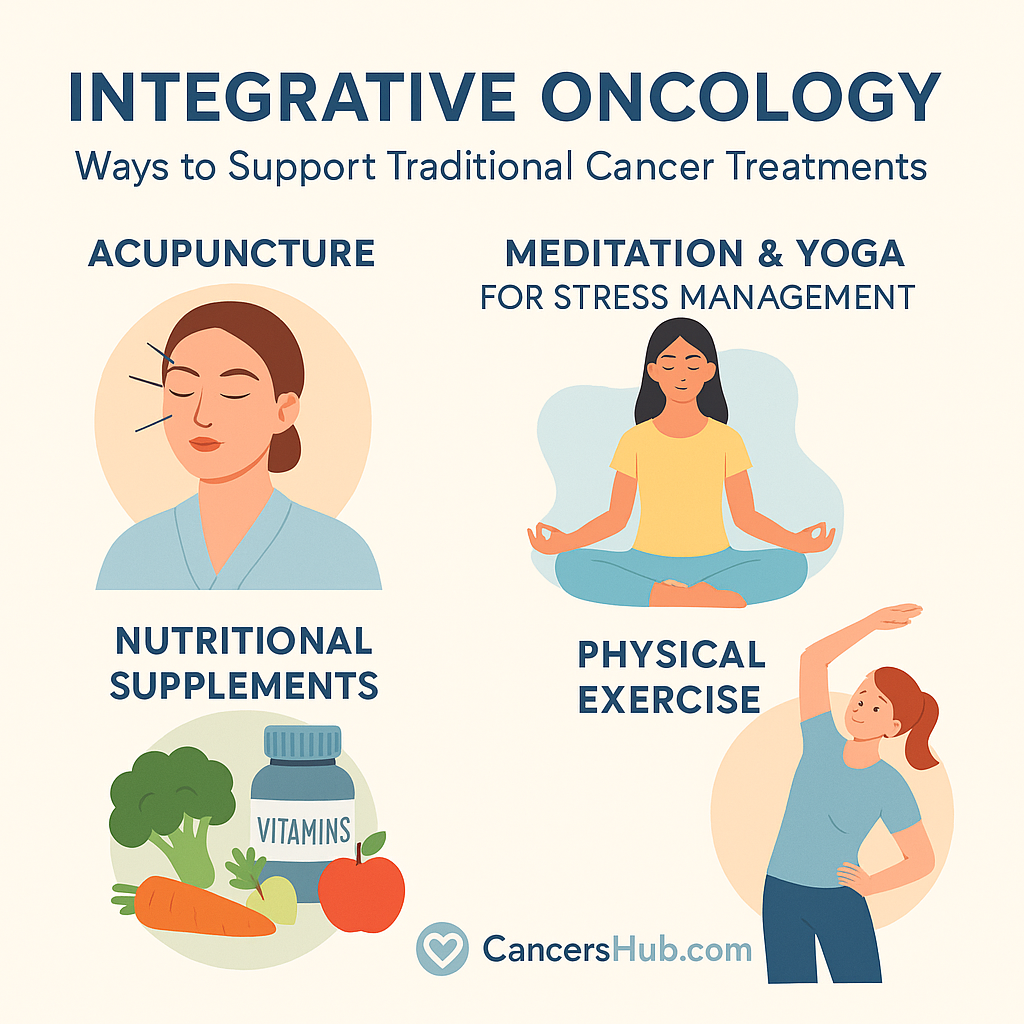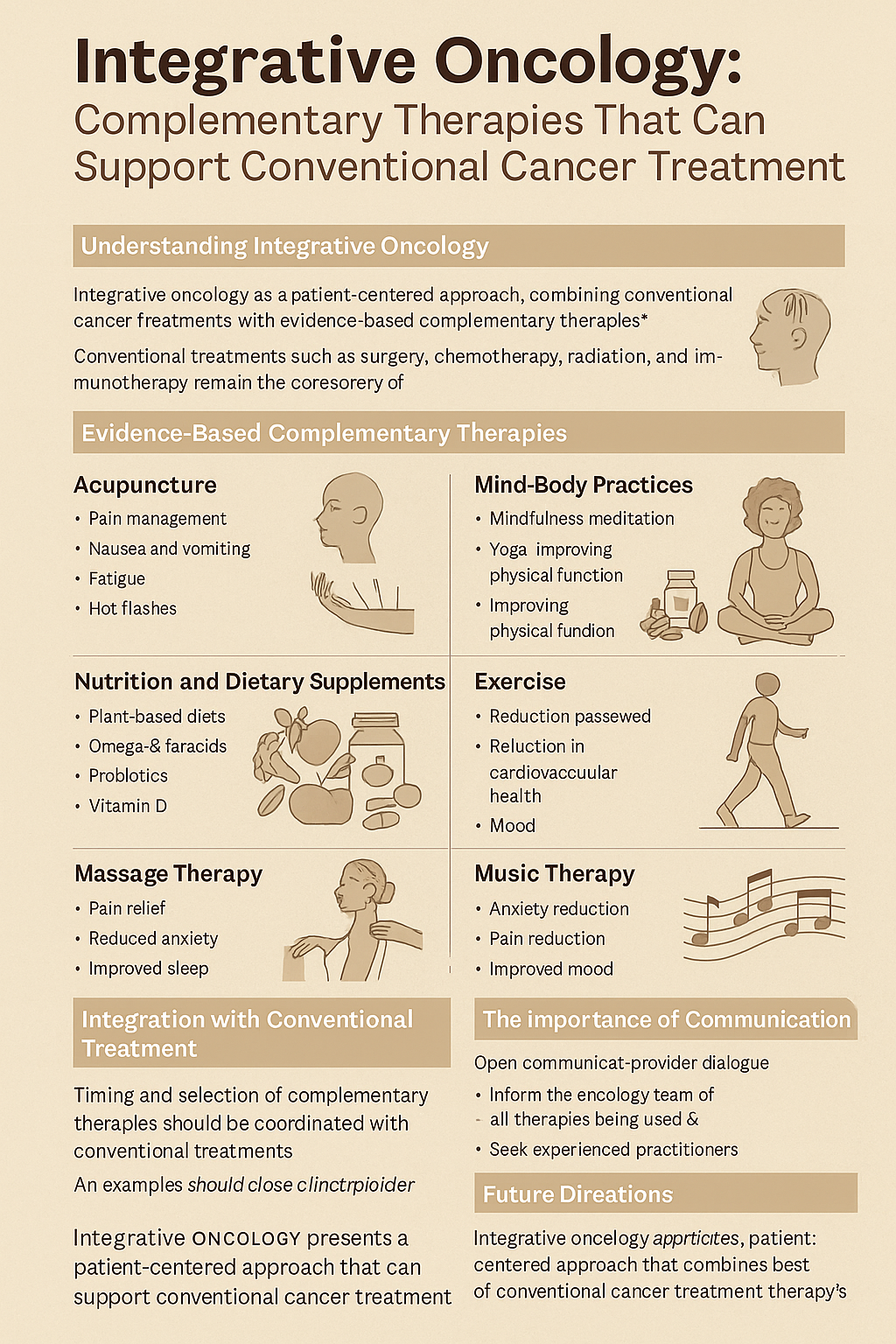Book Appointment Now

Integrative Oncology: Complementary Therapies That Can Support Conventional Cancer Treatment
Introduction
Cancer treatment has evolved significantly in recent years, with a growing recognition that addressing the whole person—not just the disease—leads to better outcomes. Integrative oncology combines conventional cancer treatments with evidence-based complementary therapies to support patients throughout their cancer journey. This approach doesn’t replace traditional treatments but works alongside them to improve quality of life, manage symptoms, and potentially enhance treatment efficacy.
Understanding Integrative Oncology
Integrative oncology takes a patient-centered approach that considers physical, emotional, and spiritual well-being. While conventional treatments such as surgery, chemotherapy, radiation, and immunotherapy remain the cornerstone of cancer care, complementary therapies address many of the side effects and challenges that accompany treatment.
The Society for Integrative Oncology (SIO) and major cancer centers worldwide now recognize the value of this approach, developing guidelines for the safe and effective incorporation of complementary therapies into standard care.

Evidence-Based Complementary Therapies
Acupuncture
Numerous clinical trials have demonstrated acupuncture’s effectiveness in managing cancer-related symptoms:
- Pain management: Studies show acupuncture can reduce cancer-related pain, including post-surgical pain and neuropathy from chemotherapy
- Nausea and vomiting: Particularly effective for chemotherapy-induced nausea when used alongside antiemetic medications
- Fatigue: Can help alleviate persistent fatigue during and after treatment
- Hot flashes: Beneficial for patients experiencing treatment-induced hot flashes, especially for breast and prostate cancer patients
Mind-Body Practices
Meditation and Mindfulness
Research indicates that mindfulness-based stress reduction (MBSR) and meditation can:
- Reduce anxiety, depression, and psychological distress
- Improve sleep quality
- Enhance overall quality of life
- Potentially reduce inflammation biomarkers
Yoga
Yoga combines physical postures, breathing techniques, and meditation, offering multiple benefits:
- Improved physical function and reduced fatigue
- Enhanced flexibility and strength
- Better emotional regulation
- Reduced anxiety and stress
- Improved sleep quality
Studies specific to breast cancer patients show yoga can significantly improve arm mobility following surgery and reduce lymphedema symptoms.
Nutrition and Dietary Supplements
While no single diet cures cancer, nutritional interventions can support treatment and recovery:
- Plant-based diets: High in fruits, vegetables, whole grains, and legumes may reduce inflammation and provide necessary nutrients
- Omega-3 fatty acids: May help manage inflammation and cachexia (muscle wasting)
- Probiotics: Can help manage treatment-related gut disturbances
- Vitamin D: Deficiency is common in cancer patients and supplementation may support immune function
It’s crucial that patients discuss supplements with their oncology team, as some can interfere with treatments.
Exercise
Regular physical activity is now considered essential during and after cancer treatment:
- Reduces fatigue, one of the most common and debilitating cancer symptoms
- Maintains muscle mass during treatment
- Improves cardiovascular health
- Enhances mood and reduces depression
- May reduce risk of recurrence for certain cancers
Exercise programs should be tailored to individual capabilities and modified throughout treatment.
Massage Therapy
Oncology massage, performed by specially trained therapists, can provide:
- Pain relief
- Reduced anxiety
- Improved sleep
- Decreased edema
- Enhanced overall well-being
Music Therapy
Whether passive listening or active participation, music therapy has been shown to:
- Reduce anxiety before and during procedures
- Decrease pain perception
- Improve mood and emotional expression
- Enhance quality of life

Integration with Conventional Treatment
The timing and selection of complementary therapies should be coordinated with the conventional treatment plan. For example:
- Acupuncture may be most beneficial when started before chemotherapy to prevent nausea
- Exercise programs need adjustment during periods of low blood counts or fatigue
- Nutritional support becomes critical during treatments that affect appetite or digestion
The Importance of Communication
Open communication between patients and their healthcare team is essential for safe and effective integrative care. Patients should:
- Inform their oncology team about all complementary therapies they’re using
- Seek practitioners experienced in working with cancer patients
- Be wary of claims promising cancer cures through alternative methods alone
Future Directions
Research in integrative oncology continues to grow, with increasing methodological rigor. Current areas of promising research include:
- Gut microbiome interventions to improve treatment efficacy and reduce side effects
- Targeted nutritional approaches based on molecular tumor characteristics
- Mind-body interventions that may influence immune function
- Personalized integrative approaches based on individual needs and preferences
Conclusion
Integrative oncology represents a patient-centered approach that combines the best of conventional cancer treatments with evidence-based complementary therapies. This approach addresses not just the disease but the whole person, helping patients navigate the challenging cancer journey with improved quality of life and well-being. As research continues to evolve, integrative approaches are becoming increasingly mainstream in cancer care, offering patients more comprehensive support throughout treatment and survivorship.



